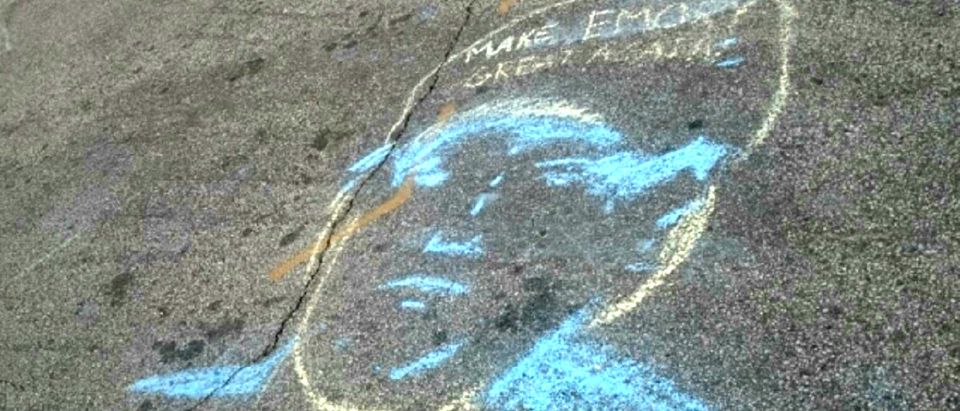Last week, a group of about 50 students at Emory University claimed that at an outbreak of pro-Donald Trump sidewalk chalk around campus was “triggering,” racist and damaging to their psychological well-being. Emory president James Wagner then legitimized the complaints, describing words such as “Vote Trump” and “Build the wall” — chalked on cement — as “perceived intimidation.”
Over the weekend, students involved in Emory’s Young Americans for Liberty chapter responded to the wailing and gnashing of teeth by the $59,444-per-year private school’s social justice warriors with a new, bigger, better political message in support of Trump, reports Inside Higher Ed.
The newest chalking at Emory represents the Republican presidential front-runner in his trademark baseball cap. Scribbled on the cap is the slogan: “Make Emory Great Again.”
Young Americans for Liberty also chalked other messages on campus on behalf of every other remaining Republican and Democratic presidential candidate. Some of the other chalk imagery also managed to make clever use of the other candidates’ slogans.
Leaders of the limited-government-focused group said their multi-candidate campus chalking adventure is manifestly not intended to endorse any particular candidate.
Instead, the goal is to buck the growing national impression that Emory is full of ninnies who are afraid of temporary, mainstream political speech that can be instantly washed away with a bucket of water and a bit of scrubbing.
“We led this protest to affirm that Emory stands for freedom of speech and expression,” Alex Reibman, a member of Emory’s Young Americans for Liberty chapter, told Inside Higher Ed. “This was about the right to chalk and the right to express opinions.”
The latest round of chalking was “a counter-protest to show that students are capable of handling chalk and that we stand for freedom of expression,” Reibman also told Inside Higher Ed.
Last week, Emory University’s student government announced that it would deploy “emergency” student funds in response to the pro-Trump chalking around campus. The announcement came one day after several dozen student protesters demonstrated outside Emory’s administration building, asking why the school had responded quickly after swastikas were drawn on a Jewish house but hadn’t reacted similarly to support for Trump. (RELATED: Emory Student Government: Pro-Trump Chalk Justifies ‘Emergency’ Measures)
In a campus-wide email, Emory’s Student Government Association (SGA) initially stated that “we do not endorse any particular candidate or political philosophy,” but then proceeded to do exactly that by explicitly denouncing political messages on campus concerning principal themes related to an election which will occur later this year.
“[B]y nature of the fact that for a significant portion of our student population, the messages represent particularly bigoted opinions, policies, and rhetoric directed at populations represented at Emory University, we would like to express our concern regarding the values espoused by the messages displayed, and our sympathy for the pain experienced by members of our community,” the message said.
Emory officials have not pursued punishment for the person or people responsible for the original chalk work.
An Emory official, campus life dean Ajay Nair, penned a lengthy essay for Inside Higher Ed defending the students offended by free political expression.
“Emory students from many backgrounds work hard to make our community better for all by raising our social and political consciousness around the many pressing issues of social justice,” Nair explains in his essay. Also, he says, writing on campus in washable chalk is illegal at Emory “without reserving the space.”
Further, Nair suggests, expressing support for Trump on the fancypants Emory campus is hurtful because the “controversial and often vitriolic nature of current political discourse is clearly painful for many people and especially difficult for groups that historically have been marginalized.”
Follow Eric on Twitter. Like Eric on Facebook. Send education-related story tips to erico@dailycaller.com.


